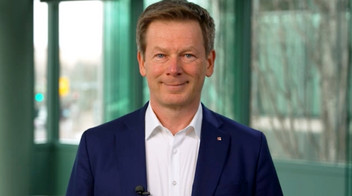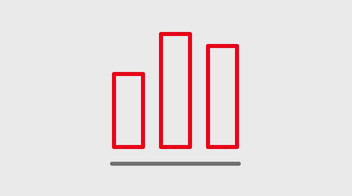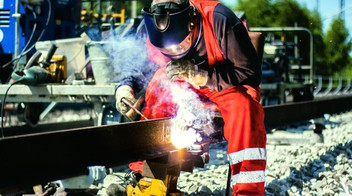Development in the year under review
- Price-related income growth drives positive profit development.
- Noticeable easing on energy markets over the course of 2023.
- Supply reliability stable at a high level.
DB Energy | 2023 | 2022 | Change | |
absolute | % | |||
Supply reliability 1) (%) | 99.99 | 99.99 | – | – |
Customer satisfaction (grade) | 2.1 | 2.1 | – | – |
Customer satisfaction, traction current and diesel (grade) | 2.3 | 2.4 | –0.1 | – |
Customer satisfaction, electricity and gas plus (intra-Group customers) (grade) | 2.1 | 2.1 | – | – |
Traction current 16.7 Hz and direct current (GWh) | 7,262 | 7,515 | –253 | –3.4 |
Traction current pass-through (16.7 Hz) (GWh) | 2,695 | 2,353 | +342 | +14.5 |
Stationary energy (50 Hz and 16.7 Hz) (GWh) | 8,590 | 13,809 | –5,219 | –37.8 |
Diesel fuel (million l) | 365.4 | 382.0 | –16.6 | –4.3 |
Total revenues (€ million) | 3,970 | 4,200 | –230 | –5.5 |
External revenues (€ million) | 1,952 | 2,451 | –499 | –20.4 |
EBITDA adjusted (€ million) | 242 | 185 | +57 | +30.8 |
EBIT adjusted (€ million) | 163 | 103 | +60 | +58.3 |
Gross capital expenditures (€ million) | 329 | 303 | +26 | +8.6 |
Net capital expenditures (€ million) | 88 | 75 | +13 | +17.3 |
Employees as of Dec 31 (FTE) | 2,055 | 1,943 | +112 | +5.8 |
| Employees annual average (FTE) | 1,984 | 1,915 | +69 | +3.6 |
Employee satisfaction (SI) | – | 4.0 | – | – |
Share of women as of Dec 31 (%) | 15.5 | 15.0 | +0.5 | – |
Share of renewable energies in the DB traction current mix 2) (%) | 68 | 65.4 | ‒ | – |
1) Preliminary figure (not rounded).
2) The data for 2023 constitutes a forecast as of February 2024. The data for 2022 corresponds to the status of the statutory electricity labeling pursuant to the German Energy Industry Act (November 2023) and may therefore deviate from the preliminary disclosures in the Integrated Report 2022. Since 2023, the proportion of renewable energy has been presented separately without Renewable Energy Sources Act (EEG) subsidies.
The high level of supply reliability was maintained.
Customer satisfaction was stable at a very good level overall. Intra-Group customers are very satisfied with employee behavior, service quality and settlement. Responses from non-Group traction current customers were not quite as good, in particular due to the difficult and tense energy market situation.
Development was uneven in volume terms:
- Traction current: Sales went down in particular due to a lower demand for rail freight transport and for regional transport. The strikes by EVG and GDL also had a dampening effect.
- Traction current pass-through for non-Group customers: Above all, the increase reflects growth in traffic volume.
- Stationary energy: Electricity sales declined significantly due to a decline in business with industrial customers and reduced optimization measures on the energy market.
- Diesel fuel: Demand also declined, driven by developments in intra-Group freight transport and local transport.
The economic development was pleasing. Higher operational expenses were more than offset by growth on the income side. Operating profit figures rose significantly.
Overall, income increased noticeably, driven by other operational income:
- Other operating income (€ +356 million): The very sharp increase was mainly due to refunds in connection with the energy price brake. The reimbursement amounts were passed on in full to DB Energy customers through a reduction in revenues.
- Revenues (–5.5%/€ –230 million): Demand-driven decline, particularly for stationary energies for non-Group customers. This was partially offset by higher sales prices in the traction current segment.
On the expenses side, there was a slight increase, mainly due to prices:
- Cost of materials (+0.9%/€ +34 million): Virtually on a par with the previous year. Higher energy procurement expenses as a result of higher procurement prices for traction and stationary energies were offset by the opposing effects of declining demand, particularly in terms of stationary energies for non-Group customers and in energy trading. On the other hand, poor power plant availability and a significant drop in market prices over the course of the year made it possible to procure replacements on the electricity trading markets at lower prices in some cases.
- Other operating expenses (+22.9%/€ +27 million): Increases in expenses were mainly due to the introduction of Group charges as well as rising expenses for the operation and further development of IT systems.
- Personnel expenses (+8.4%/€ +13 million): The increase was due to the higher number of employees and to collective bargaining.
- Depreciation (–3.7%/€ –3 million): Slight decrease in depreciation of intangible assets.
Gross capital expenditures rose, particularly in the area of other energy supply systems (e.g. new construction of converter stations) within the framework of the Performance and Financing Agreement (LuFV) III.
The number of employees increased primarily in order to implement the higher project volume arising from LuFV III and for digitalization.
The share of women increased slightly.
The proportion of renewable energies in the DB traction current mix in Germany has continued to increase.


